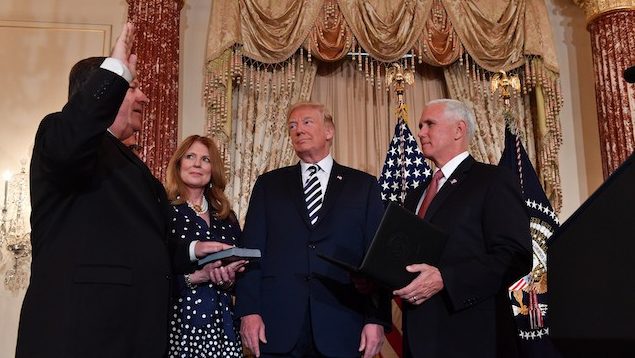As the U.S. State Department gears up to release its annual Global Report on Trafficking in Persons next month, there’s a crucial element missing. The State Department still has no ambassador-at-large at the Office to Monitor and Combat Trafficking in Persons — a post that has been unfilled for nearly a year.
Take action against forced labor in the U.S..
When now-Secretary of State Mike Pompeo was confirmed in April, he promised to fill the many vacant positions at the State Department.
Last year the Trump administration asked President Barack Obama’s ambassador, Susan Coppedge, to stay on to oversee the launch of the 2017 Trafficking in Persons report. It was rumored then that Cindy McCain, Republican Sen. John McCain’s spouse, would be offered the post, but that never materialized.
Foreign Policy reports that the State Department cannot go on much longer without filling this critical position:
The administration has considered some other serious candidates since, including John Cotton Richmond, the founding director of the Human Trafficking Institute and a former federal prosecutor at the Department of Justice. Yet, with the imminent release of the 2018 report, there is no political leader of the office, nor an announced intention to nominate a particular successor to Coppedge.
Unless the Trump team names a nominee soon, this year’s report will come with no one at the helm to set policy priorities, and the department will miss an opportunity to make use of the leverage the report provides.
One of the authors of this piece, Mark P. Lagon, as former ambassador-at-large to combat trafficking in persons in the George W. Bush administration from 2007 to 2009, has seen how the office and its leader can make a difference. Even in the last two years of an administration, an ambassador can change the debate, highlighting impunity for trafficking for labor, and win credible rankings — working together with other senior officials.
On top of this, the attorney general has not issued a report on U.S. efforts to combat human trafficking since 2015. While fighting human trafficking has broad bipartisan support, last year Congress failed to reauthorize the Trafficking Victims Protection Act, a key piece of anti-trafficking legislation related to the Global Trafficking in Persons report.
In recent years the TIP report has been criticized as a biased political tool, namely after the upgrade in the rankings of Malaysia and Cuba in 2015. Reuters reported that the U.S. government manipulated the rankings for political purposes, including Malaysia’s upgrade to clear the way for the country to become part of the Trans-Pacific Partnership, and senior State Department officials overruled official recommendations for rankings in at least 14 different countries.
Yet as Lagon writes, “Without an appointed head of the office, there is no one to go head to head with the assistant secretaries at the regional bureaus of the State Department to defend the rankings the office recommends from inconsistencies and political whims, working to make it a reflection of facts on the ground.”
Join our call to end forced labor in U.S. detention centers.







Freedom United is interested in hearing from our community and welcomes relevant, informed comments, advice, and insights that advance the conversation around our campaigns and advocacy. We value inclusivity and respect within our community. To be approved, your comments should be civil.